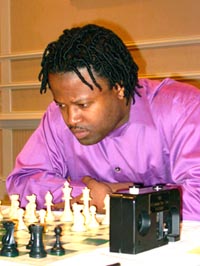|
Ashley's discussed the benefits of chess in the usual parlance, but one interesting point made during the interview was that chess teaches you to "defer gratification." He reasoned that in chess if you grab something, or make a hasty decision, you pay the ultimate price. "Chess demands that you use your mind," he asserted.
Ashley took Gates on a tour of the Harlem Educational Activity Fund (HEAF) organization which was designed to provide after-school program to help inner-city children excel. One point that was made was that many of the youth joined the program because of chess. What was so impressive was the eyes of determination of one student who stated "he wanted to be a Grandmaster."
The success of this program was due, in no small part, to the role Ashley played as the Director and the role of National Master Jerald Times, an instructor. Despite the fact that the funds ran out for that program, other initiatives are starting to surface which will provide such a positive outlet for Black youth. Of course, Black youth will also need to rely on their own communities to provide these types of programs as well.
|
|
